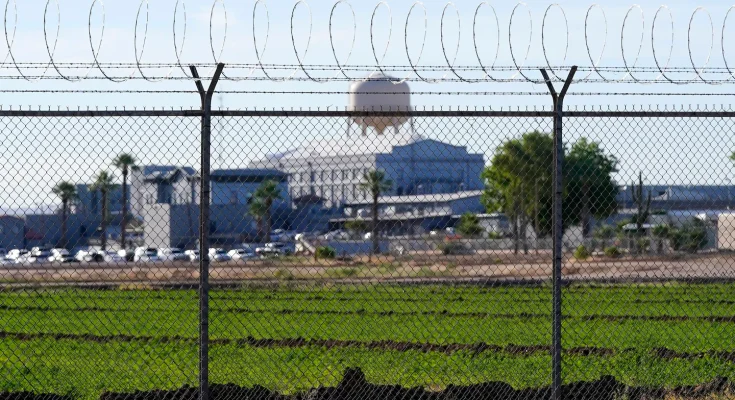With a man set to be executed, Arizona’s former death penalty review commissioner says he has “no reason to believe” the state is ready to restart executions.
Arizona is carrying out its first execution in years on Wednesday, after a pause because of botched lethal injections, transparency issues and difficulty securing the necessary drugs
The state plans to execute Aaron Gunches, who was sentenced to death for killing his then-girlfriend’s ex-husband in 2002. The restart will test Arizona’s revamped death penalty process under Gov. Katie Hobbs (D).
But the man tapped to review the state’s executions says he has “no reason to believe” Arizona is ready to restart executions in a way that doesn’t repeat past mistakes. David K. Duncan was Hobbs’s death penalty independent review commissioner until he was fired in November.
“I have pierced the [veil],” said Duncan, a retired federal magistrate judge. “And what I have seen are things that are chilling.”
In recent months Hobbs has expressed confidence in the state’s corrections department and its ability to perform executions.
“They have thoroughly gone through every procedure and process and updated them,” Hobbs said in December, according to Capitol Media Services. “And I’m confident in the process.’’
Hobbs’s office did not respond to a request for comment Monday asking what, if anything, had informed her faith in the state’s preparedness, beyond its own internal review.
Questions about execution drugs and staffing
When Hobbs took office in 2023, death penalty researchers considered Arizona’s three most recent executions to be irregular, if not botched — though state officials have steadfastly maintained its executions have been lawful. Years earlier, Arizona had sought to illegally import a hard-to-obtain execution drug from overseas. And in 2014, the lethal injection of prisoner Joseph Wood was so disastrous that it triggered an eight-year pause on executions statewide.
Hobbs declined to carry out Gunches’s sentence in the first weeks of her administration, vowing no executions on her watch until Arizona could assure residents “that the State is not violating the law in carrying out the gravest of penalties.” She hired Duncan in February 2023 to review the state’s death penalty and produce a report.
In November 2024, an Arizona Department of Corrections, Rehabilitation & Reentry official wrote a letter to Hobbs’s office criticizing Duncan’s accuracy and work process. Duncan disputes all the allegations. That same day, the ADCRR director also sent Hobbs a letter with a report outlining the department’s preparedness for executions.
Four days after that letter was sent — and two weeks before Duncan planned to submit his report — Hobbs fired Duncan. She later told local media he was “not up to the task” and criticized his review for expanding beyond the scope of what she asked. Hobbs said that while she was grateful for Duncan’s work, “we decided to go in a different direction.”
State projects confidence
With Duncan’s report shelved, the state appears to be taking its assurances from corrections department director Ryan Thornell who, in a letter to Hobbs in November, presented a confident picture of a department he said had investigated and learned from its errors.
Among the changes Thornell outlined: The corrections department had reviewed the qualifications of the pharmacy that compounds its drugs, increased the training frequency of the medical and IV team, and doubled that team’s size. Several of the changes to the department’s policy positions were informed by discussions and site visits with other states, Thornell wrote.
“I am confident in the methodology I used in leading this effort and am satisfied with the outcome,” Thornell said. He called the corrections department “operationally prepared to proceed with an execution.”
The man most affected by the state’s readiness to carry out executions is Gunches, whose lethal injection will unfold without the usual backstop of pre-execution judicial scrutiny. He has represented himself throughout his case, waiving his appeals and clemency process, making him an execution “volunteer.”
Execution “volunteers” often unwittingly jump-start a state’s dormant death penalty while making it easier for states to kill other prisoners later, said Robert Dunham, who directs the Death Penalty Policy Project, which publishes research and analysis on capital punishment. In a normal appeals process, judges hear from expert witnesses and evaluate potential past issues with the death penalty raised by the defense. Volunteers like Gunches waive that entire process, eliminating a layer of scrutiny.
“The impact of volunteers is especially pernicious when the system is at a standstill,” Dunham said. “You don’t get the ‘careful’ judicial review that you’re supposed to get in death penalty cases.”
Gunches stood trial for Ted Price’s killing but waived his right to a lawyer and pleaded guilty while representing himself, according to court records. He was sentenced to death in 2008. That sentence was then vacated in the state’s automatic appeal process, but it was reissued and upheld on a second automatic appeal in 2016.
Gunches eventually began filing handwritten motions asking the state to execute him — in part, he wrote, to give closure to his victim’s family. He did not respond to The Post’s request to discuss his case when contacted through Arizona’s prison messaging system.
As Gunches faces lethal injection on Wednesday, Duncan said he hopes the state’s changes yield a lawful execution that does not cause him to suffer. He plans to release an amended version of his report on his own, firm in his belief that the public should know everything it can about the most serious punishment carried out in its name.



